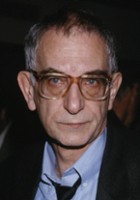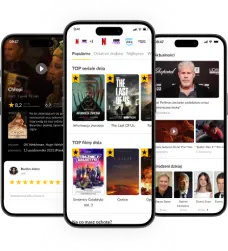powrót do forum osoby Krzysztof Kieślowski
In Memoriam - Krzysztof Kieslowski
To Smoke and Drink in L.A.
Premiere, June 1996
By Harvey Weinstein
He drank too much and smoked too much, he was proud,
arrogant, entertainingly cynical - in other words, my kind of
guy. He was also one of the world's great directors.
The first time I heard of Krzysztof Kieslowski was in 1990,
when Trea Hoving, our head of acquisitions at Miramax, told
me I had to see The Decalogue, a ten-hour miniseries made
for Polish TV and based on the Ten Commandments. The
thought of seeing ten hours of Polish TV and going to London
to do it seemed about as appealing as going to the dentist. But
Trea was persistent and I found myself in a screening room in
London with two six-packs of Diet Coke and one of those
boring British pickle-and-cheese sandwiches. Ten hours later,
I had had my sense of cinema rearranged. I walked out of the
room both devastated and euphoric, having just run the
gauntlet of every emotion. I suppose if you wanted to
summarize the theme of this man's career in two words, they
would be human nature. Although he lived in a world
permeated by politics, Krzysztof's films were always about
the human condition.
In the spring of 1991, I saw ten minutes of footage from The
Double Life of Veronique, read the script, and bought the
movie. I saw the completed movie in Paris three months later.
and met Kieslowski for the first time. The film was one of the
most romantic I'd ever seen. Meeting him, I first noticed that
he wore the mask of European cool; I later learned that that
mask hid a huge reservoir of compassion. I also discovered
that the man whom those around me revered with awe as a
cinematic genius, and who often appeared stubborn and
arrogant, could also be warm, honest, and down-to-earth. And
while his work was touched by the divine, the man himself
was a total pragmatist. Most important, he introduced me to
Polish vodka, which he swore was better than Russian.
But while I loved The Double Life of Veronique, I just didn't
get the ending. Later on, in Cannes. where the film premiered,
none of the highbrow critics I asked, nor the so-called
intellectuals on my staff, could explain to me what the freeze
on Veronique's hand as she touches a tree meant. So I did the
unthinkable. When he came to New York for the opening
night of the New York Film Festival, I asked the master what
he was trying to say. Expecting some revelation of great
profundity, I got simplicity itself: Veronique has had a really
bad day and is going home to Daddv. Now I knew Krzysztof
was not trying to do one of those parlor-game endings that
you scratch your head at trying to figure out what the director
is trying to say, or break your hand patting yourself on the
back for being so smart that you figured it out. So I committed
heresy. I asked Krzysztof to change the ending to make his
intention a little clearer to American audiences. He said he
would consider it. This was Krzysztof Kieslowski, however,
and even I didn't want to press the issue too hard.
Then, the morning after the film screened at the festival, I got
a phone call. It was Krzysztof: "Come over right away. I want
to change the ending. they don't get it." He'd quizzed some of
the guests at the party after the screening and realized that if
the Fifth Avenue crowd didn't get his ending, it certainly
wasn't going to play in Peoria. We Sat in a hotel room and
Krzysztof drew storyboards for me on hotel stationery of the
changes he wanted to make. We brought in the footage from
Poland and, using Krzysztof' storvboards, made the changes.
We promoted the hell out of the film, and, despite a bad
review in The New York Times and an even worse review in
the Los Angeles Times from Peter Rainer, who compared the
film to a perfume commercial, it grossed $2 million and won
several critics awards and a Golden Globe nomination for Best
Foreign Film. Krzysztof had his first hit in America.
Quentin Tarantino had seen The Double Life of Veronique at
the Cannes Film Festival when he was there with Reservoir
Dogs, and he wrote the part of the boxer's girlfriend in Pulp
Fiction (eventually played by Maria de Medeiros) for Irene
Jacob, the young French actress Krzysztof had used as his
lead. Later, Quentin asked me to approach Irene about taking
the role. She was flattered, but she had already made a
commitment to be in a trilogy Krzysztof was working on. That
was the first I heard about this dazzling series of films.
Trea and I read the scripts of Krzysztofs Three Colors trilogy
about liberty, equality, and fraternity (and entitled Blue,
White, and Red, respectively) in the summer of 1993 and
loved them. But Marin Karmitz, the producer, wouldn't sell
the movies at that stage because he wanted to make sure that
all his buyers shared his enthusiasm. What? I flew to Paris
with Trea and Agnes Mentre, the president of Miramax-Zoe.
We screened Blue in Karmitz's tiny screening room. The story
of a woman whose husband and child are killed in a car
accident she survives, Blue stars the luminous Juliette
Binoche. I've lost my father at an early age, and all the
emotions of that loss came flooding back. I found myself
sobbing at the end of it. Business sometimes deals in the
unspoken, and I think when Karmitz saw the look on my face
and the tears from this so-called tough guy, he knew and I
knew that Miramax and the trilogy were fated.
With White, a comedy about a Polish hairdresser who takes
revenge on his French wife, we discovered Krzysztof's flair
for comedy. At every film festival and award ceremony, from
Telluride to the New York Film Festival to the Golden
Globes, Krzysztof was always there with his Polish vodka and
his cigarettes, even when the event was in that smoker's hell
known as L.A. I always had to assign one person on my staff
to figure out where he could smoke, and, after three vodkas,
my normal competitive nature was so dull that I didn't care if
we won or lost. Krzysztof says in Kieslowski On Kieslowski,
"I've got an increasingly strong feeling that all we really care
about is ourselves. Even when we notice other people we're
still thinking of ourselves. That's one of subjects of Red -
fraternity." when I saw Red for the first time at the Cannes
Film Festival, I was with Quentin, and after the film, he turned
to me and said, "That's the best movie of this year and it's
going to win the Palme d'or." We all presumed that Krzysztof
had the Palme all locked up. So not only were we blown away
when Pulp Fiction won, we were even more blown away that
Red didn't get anything.
Later that night, I saw Krzysztof, always the fatalist, having a
rip-roaring good time at the production company MK2's boat
dancing with Irene Jacob. If I had to weigh which was more
fun, winning the Palme d'or or dancing with Irene, I think
they'd be just about equal. With Krzysztof's death, my heart
goes out Irene. The muse has lost her painter.
Ironically, Red was delivered a second blow when it was
disqualified on a technicality as the Swiss entry for the 1994
Academy
Award for Best Foreign Language Film. A similar blow had
been delivered to Blue the year before. But the membership of
the Academy stepped to the plate and nominated Red for Best
Director, Best Original Screenplay, and Best Cinematography.
That recognition helped make Red a phenomenal success in
the U.S. Red, which ended up being his last film, was really
loved by filmgoers and critics alike. Many reviewers who had
not been fans came on board the Kieslowski bandwagon with
Red.
When I called Krzysztof on the morning the nominations were
announced to tell him the good news, he put me on hold. He
was talking to his insurance agent about his car, and before he
would listen to the good news, he had to finish the call and
then tell me his car troubles. He was a first-things-first guy.
Krzysztof came to the Oscars last year even though they were
in L.A. We found the smoking area in the Shrine for him, but
had a much tougher time with the Governors Ball. He
smuggled in the Polish vodka and I joined happily in his
conspiracy.
All my other filmmaker friends wanted to know what we
talked about, what he was like - did we contemplate the
metaphysical nature of human existence together? The truth
was, we talked about soccer or the news of our families. He
was an incredibly down-to-earth guy. I suppose in retrospect
we did talk about the metaphysical nature of human existence.
I just didn't realize we were doing it at the time. It was small
talk.
Everyone was asking him if he was really retiring, and he kept
saying yes. But I saw the crease of a smile at the edge of his
mouth. He was exhausted. He needed a rest. Publicly, he was
definitely retiring, but privately he was not so sure. Ironically,
just as he left L.A., after the Oscars, he confided to me that he
was thinking of another trilogy. He told me: "In case I ever
decide to do something else, I have this idea about a trilogy on
heaven, hell, and purgatory, set in three different cities. I
don't know vet where I'd set heaven or purgatory, but I think
I'd set hell in L.A."
Sadly, a heart attack spared L.A. from the sharp eve of the
master. Krzysztof Kieslowski lived the life he wanted to live,
though not enough of it. He was a giant of the cinema and a
crusader for humanity. I'll miss the movies, I'lll miss the
vodka, but more important, I'll miss the man.
http://www.petey.com/kk/docs/smkedrnk.txt


